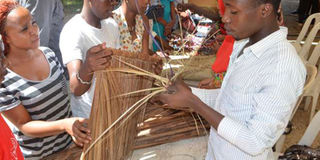Policies needed to reflect new reality

Mombasa youth are shown how to make roofing out of palm leaves during the launch of the 2016 Youth Entrepreneurship Galla at the Swahili Cultural Centre in Mombasa on May 13, 2016. Some African countries, such as Kenya, are eager to explore new horizons in trade. PHOTO | KEVIN ODIT | NATION MEDIA GROUP
What you need to know:
- Agoa has had important successes, including helping African countries nearly triple their non-oil exports to the US.
- Silicon Savannah companies need, among other things, freer data flows, more transparent regulation, and access to services markets.
California’s Silicon Valley is nearly 10,000 miles from Kenya’s Silicon Savannah but they share a role as innovation hubs for their respective countries.
Just as Silicon Valley has transformed business in the United States, Silicon Savannah entrepreneurs are now helping Kenya leapfrog into the 21st century global economy.
Thousands of new apps — such as mobile-payment M-Pesa and M-Farm, a women-developed service — have emerged from Silicon Savannah and are demonstrating Africa’s tremendous potential.
At the African Growth and Opportunity Act forum, held last month in Washington, DC, delegates from the US and African countries have been considering how best to realise that potential and explore what approaches and policies will most effectively deepen economic ties between the US and a rising Africa.
For the past 16 years, the African Growth and Opportunity Act (Agoa) has shaped the US-Africa trade policy by providing eligible sub-Saharan African countries with one-way, duty-free access to American markets.
Agoa has had important successes, including helping African countries nearly triple their non-oil exports to the US.
Last year, Congress re-authorised Agoa and extended it for another 10 years.
As a result, many companies are taking a fresh look at investment opportunities and sourcing options in countries such as Kenya and Ethiopia.
But, because it focuses mainly on tariffs, Agoa is limited in addressing other economic challenges in African countries.
These include supply-side constraints to regional and global trade and the need for greater value-added production and export diversification.
Silicon Savannah companies, for example, are facing new and evolving challenges far outside the scope of tariff-preference, which are primarily a development tool.
These challenges may be better addressed by policies resembling free-trade agreements, which define the rules of the road for bilateral trade.
Silicon Savannah companies need, among other things, freer data flows, more transparent regulation, and access to services markets.
Eliminating barriers in these areas will be critical for African entrepreneurs seeking to offer their products and services to American consumers, and to American entrepreneurs seeking opportunities in Africa.
An updated policy is urgently needed.
SETTING THE PACE
Today, Africa has a golden opportunity to reap a so-called demographic dividend as declining infant mortality and other factors create a youth bulge in the continent’s population.
Africa is home to 430 million children under the age of 15.
By 2030, the continent will account for almost one-quarter of the world’s workforce and consumers.
With the right policies in place to invest in skills training, create good formal-sector jobs, and access important regional and overseas markets, Africa could become an important contributor to global economic growth.
Without such policies, it will suffer economic malaise and political instability.
Africa as a whole holds great promise, but it is not a monolithic continent.
Each of its many countries has its own economic needs and strengths, and we as policymakers must be mindful of the continent’s rich diversity.
That means we should seek inclusive policies that do not write off any country.
We should also support Africa’s regional integration while avoiding “lowest-common-denominator” approaches that prevent our relationships from reaching their greatest potential.
Some African countries, such as Kenya, are eager to explore new horizons in trade.
We should encourage and enable them to do so.
THE FUTURE
Such regional leaders can play an important role in continent-wide development by blazing a trail for others to follow in the future — and along which they can help bring their neighbours over time.
Participants at the Agoa forum are debating whether this approach, or some alternative, is best for advancing the US-Africa trade and investment relationship, and the conversation will certainly continue in the months to come. This is the beginning of an important dialogue.
The stakes for both Africa and the US are high.
A strong, prosperous Africa with a productive and expanding middle class is in America’s interest, and a strong partnership with the US will be vital for Africa’s continued growth and development.
The decisions we make now will have implications for generations to come.
We owe it to our descendants — and to the Silicon Savannah entrepreneurs already leading the charge — to get it right.
Mr Froman is the US Trade representative. Ms Mohamed is Cabinet secretary for Foreign Affairs of Kenya. Copyright: Project Syndicate, 2016.




